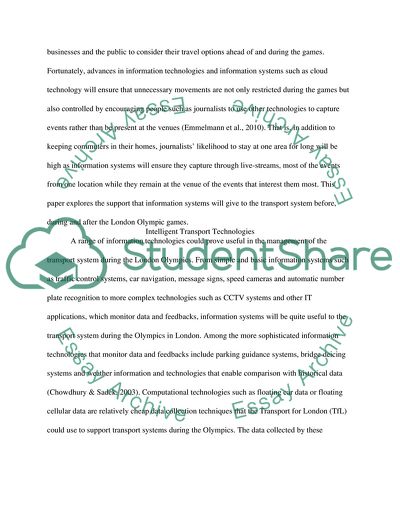Cite this document
(How Information Systems Support Transportation Systems Before, During and After the Olympic Games Case Study Example | Topics and Well Written Essays - 2500 words, n.d.)
How Information Systems Support Transportation Systems Before, During and After the Olympic Games Case Study Example | Topics and Well Written Essays - 2500 words. https://studentshare.org/information-technology/1768626-how-are-information-systems-able-to-support-and-improve-transportation-systems-before-during-and-after-the-olympic-games-in-london-this-summer
How Information Systems Support Transportation Systems Before, During and After the Olympic Games Case Study Example | Topics and Well Written Essays - 2500 words. https://studentshare.org/information-technology/1768626-how-are-information-systems-able-to-support-and-improve-transportation-systems-before-during-and-after-the-olympic-games-in-london-this-summer
(How Information Systems Support Transportation Systems Before, During and After the Olympic Games Case Study Example | Topics and Well Written Essays - 2500 Words)
How Information Systems Support Transportation Systems Before, During and After the Olympic Games Case Study Example | Topics and Well Written Essays - 2500 Words. https://studentshare.org/information-technology/1768626-how-are-information-systems-able-to-support-and-improve-transportation-systems-before-during-and-after-the-olympic-games-in-london-this-summer.
How Information Systems Support Transportation Systems Before, During and After the Olympic Games Case Study Example | Topics and Well Written Essays - 2500 Words. https://studentshare.org/information-technology/1768626-how-are-information-systems-able-to-support-and-improve-transportation-systems-before-during-and-after-the-olympic-games-in-london-this-summer.
“How Information Systems Support Transportation Systems Before, During and After the Olympic Games Case Study Example | Topics and Well Written Essays - 2500 Words”. https://studentshare.org/information-technology/1768626-how-are-information-systems-able-to-support-and-improve-transportation-systems-before-during-and-after-the-olympic-games-in-london-this-summer.


